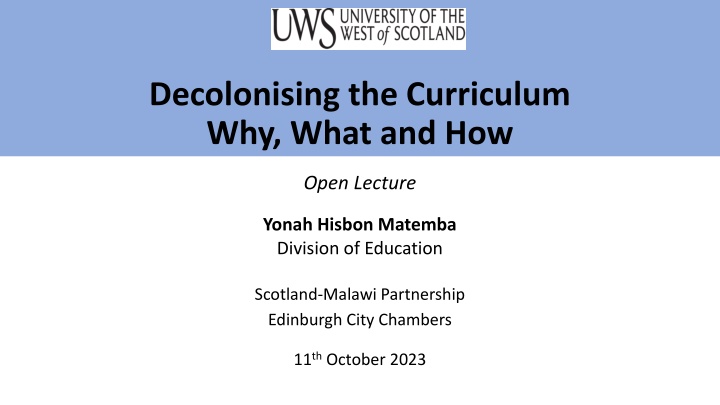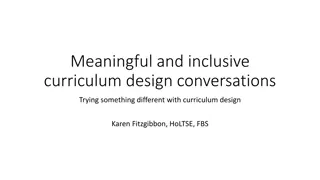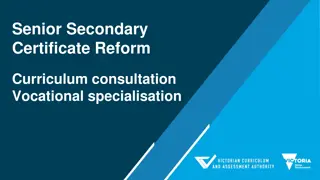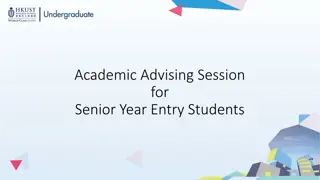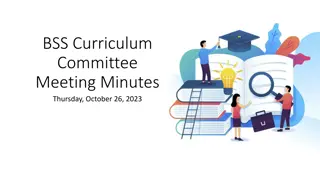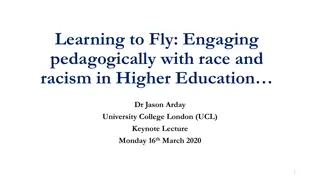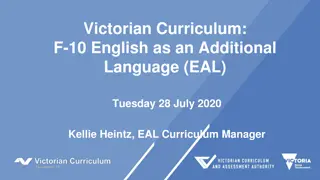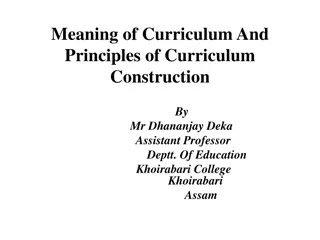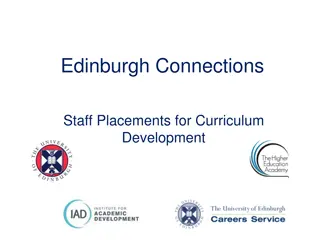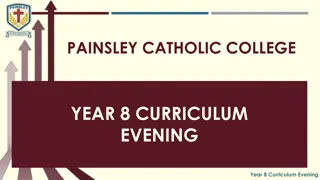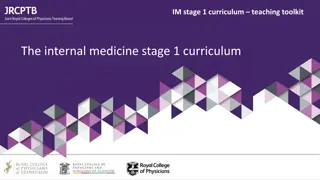Decolonising the Curriculum Why, What and How
Explore the complexities of decolonising the curriculum in Scottish education, addressing epistemic privilege, Black History Month, Scottish history and colonialism, missionary movements, and the nuances of the curriculum itself. Consider the purpose and impact of decolonisation efforts in reshaping educational paradigms for a more inclusive future.
Download Presentation

Please find below an Image/Link to download the presentation.
The content on the website is provided AS IS for your information and personal use only. It may not be sold, licensed, or shared on other websites without obtaining consent from the author.If you encounter any issues during the download, it is possible that the publisher has removed the file from their server.
You are allowed to download the files provided on this website for personal or commercial use, subject to the condition that they are used lawfully. All files are the property of their respective owners.
The content on the website is provided AS IS for your information and personal use only. It may not be sold, licensed, or shared on other websites without obtaining consent from the author.
E N D
Presentation Transcript
Decolonising the Curriculum Why, What and How Open Lecture Yonah Hisbon Matemba Division of Education Scotland-Malawi Partnership Edinburgh City Chambers 11thOctober 2023
Introduction Epistemic privilege is in the side of the colonizer [not the colonized ] (Mignolo, 2007: 459)
Of Black History Month, (Anti/Neo)coloniality and Hashtag Activism This October is Black History month. Has decolonisation lost its lustre? Who is afraid of decolonisation (Hall, Ansley and Connolly, 2023) Anticolonial movement (Marmon, 2023) Postcolonial environment (Fanon, 1967; Ngugi, 1986) #BlackLivesMatter (Busey and Coleman-King, 2023), #RhodesMustFall (Pillary, 2016)
Scottish Context Yet I live here, I live here too (Heaney, 1990: 22)
Scottish History, Colonialism and the Curriculum Collusion with colonialism as part of the British Empire. Curriculum exists in and responds to socio-cultural context Connections with slavery and the slave trade. River Clyde, ship building and Trans- Atlantic Slave Trade. Scottish slave owners beneficiaries of a secret British government pay ( 1.5 billion) for the loss of property .
Scottish missionary movement s complicity with British colonialism. Scottish museums colonial legacy Scottish street names, statues, and other monuments Scotland has a sizeable immigrant population
Complexities of the Curriculum Curriculum is a complex phenomenon (Johnson-Mardones, 2015: 123)
The Curriculum What is the Curriculum? Totality of students regular learning and related experiences occurring in the educational process, whether planned or not. Types of Curriculum Formal/official curriculum Actual/delivered curriculum Informal curriculum Null/excluded/hidden curriculum
Purpose of the Curriculum Curriculum not value-neutral Selective tradition Encapsulates norms, values and philosophies society thinks will benefit the child. Assumptions Selection/deselection of knowledge - what is included or not in the curriculum, and why (Apple, 2004) Ambitions Beliefs Ideologies Curriculum aims/outcomes Hegemonic epistemologies as official knowledge . Political Ideological Propaganda Educational Cultural Economic
Colonial-Neocolonial Continuum "Colonial exploitation is not the same as other forms of exploitation (Fanon, 1967: 88)
Coloniality Epistemological frame and the colonial project (Mignolo, 2007) White fragility and white guilt/shame (DiAngelo, 2011; Hess, 2017) Silencing and relegating other epistemologies (Mignolo, 2007) Matrix of power (Quijano, 2000) Domination and history of epistemic violence (Spivak, 1991) Privilege and racialised politics (Mignolo, 2000)
Neocoloniality Neocoloniality False belief in universalism that only Westernised canons attribute to truth (Ngugi, 1986) False decoloniality ; illusions of liberation (Kepe and Hall, 2018) Entrapped in a colonial caged mentality (Cossa, 2018) Dependency culture on Western materialism (Clapman, 2020) Double consciousness, identity masks and the colonised mind (Fanon, 1986) White saviour industrial complex (Hoffman, 2022) Colonial space still scripting the other (Simmons and Sefa-Dei 2012) Commodification and coloniality ratified with a code ethics (Quijano, 2000)
Colonised Curriculum The colonised curriculum serves the interest of the rich people as it prepares some people to be dominated (Mashiyi, Meda, and Swart, 2020)
Curriculum in a Colonial Formulation Focuses on singularity of interpretation to knowledge-making. Does not engage with uncomfortable issues. Centres on selected knowledge Ignores colonial epistemic violence Draws on theories only from hegemonic discourses. Does not acknowledge its omissions and exclusions. Celebrates supposed colonial triumphalism. Demonises non- normative knowledges Minimises Black pain (Motshabi, 2020) Antipathetic to reparations Peppers over structural racism Fails to interrogate structural location
Decolonisation It is in relation to the place of the Other that colonial desire is articulated (Fanon, 1967: xv)
Decolonisation Taking the Bull [Colonialism/Coloniality] by the Horns Challenging (neo/re)colonisation (Hundle, 2019; Matemba, 2021). Decentering hegemonic epistemologies (Jansen cited in Mathebula, 2019). Encouraging plurality and democratic open- endedness (Manthalu and Waghid, 2019), Undoing coloniality (Heleta, 2016; Fanon, 1967) Critiquing self (as well as others) (Matemba, 2022), Re-embodiment of thought (Nyoni, 2019) Different ways of thinking, knowing, and doing (Nye 2019; Emard and Nelson, 2020) Decolonisation towards social justice, equity and equality (Albertus, 2019) Disobeying coloniality (Mignolo, 2007)
Decolonisation, Not Erasure Decolonisation is not about deleting. Prof Rowena Arshad (2021) has said: To decolonise is not about deleting knowledge or histories that have been developed in the West or colonial nations, rather it is to situate the histories and knowledges that do not originate from the West against the context of imperialism, colonialism and power and to consider why these have been marginalised and de- centered (2021). Do not tear down statues but decolonise them (Palmer, 2021)
Decolonising the Curriculum Statues fall, fees fall but curricula don t fall (Shay, 2016: np) The university went to decolonise and all they brought back was lousy diversity double-speak! (Doharty, Madriaga and Joseph-Salisbury, 2021)
How To Decolonise the Curriculum Pay attention to structural location (Matemba, 2022) Teach difficult colonial history (MacDonald, L. and Kidman, 2022) Embed counter-hegemonic strategies (Sathorar and Geduld, 2018) Create decolonial spaces (Matemba, 2021) Involve different voices (Shay, 2016) Teach white fragility (DiAngleo, 2011) Recentre marginalised knowledges (Mignolo, 2007)
Use diverse sources in teaching (Winter, Webb, and Turner, 2022) Challenge racial stereotypes (DiAngelo, 2011) Alter assessment (Winter, Webb, and Turner, 2022) Foster inclusive practices (Baumfield, 2003). Decolonise first before diversifying it (Doharty, Madriaga and Joseph- Salisbury, 2021) Include anti-racist programmes (Hall, Ansley and Connolly, 2023)
Plenary Silence a form of quiet, slow, psychological violence (Pillay, 2016: 157) What is your structural location related to decolonisation? How can you deconstruct yourself in order to decolonise praxis? How does your structural location facilitate or hinder the decolonisation of the curriculum?
Thank You Further inquiry, please email: Yonah.Matemba@uws.ac.uk
References Apple, M. (2004) Ideology and Curriculum, New York: Routledge Clapham, C. (2020) Briefing Decolonising African Studies? The Journal of Modern African Studies, 58(1), pp. 137-153. Busey, C.L. and Coleman-King, C. (2023) All Around the World Same Song: Transnational Anti-Black Racism and New (and Old) Directions for Critical Race Theory in Educational Research, Urban Education, 58(6), pp. 1327 1354. Cossa, J. (2018) Addressing the Challenge of Coloniality in the Promise of Modernity and Cosmopolitanism to Higher Education: De-Bordering, De-centrering/De- peripherizing, and De-colonilizing. In Re-Visioning Education in Africa: Ubuntu-Inspired Education for Humanity, edited by E. J. Takyi-Amoako and N. T. Assie-Lumumba, 193 204. London: Palgrave- MacMillan. Doharty, N., Madriaga, M. and Joseph-Salisbury, R. (2021) The university went to decolonise and all they brought back was lousy diversity double-speak! Critical race counter-stories from faculty of colour in decolonial times, Educational Philosophy and Theory, 53(3), PP. 233-244. DiAngelo, R. (2011) WhiteFragility, International Journal of Critical Pedagogy, 3(3), pp. 54-70. Fanon, F. (1967) Black Skin, White Masks, Grove Press. Heaney, S. (1990) New Selected Poems 1966 1987, London, Faber & Faber. Hess, M. (2017) White Religious Educators Resisiting White Fragility: Lesson from Mystics, Religious Education, 112(1), pp. 46-57. Hall, R., Ansley, L. and Connolly, P (2023) Decolonising or anti-racism? Exploring the limits of possibility in higher education, Teaching in Higher Education: DOI: 10.1080/13562517.2023.2201676 (10 October 2023). Hoffman, D.M. (2022) White Savior or Local Hero?: Conflicting Narratives of Help in Haiti, Georgetown Journal of International Affairs, 23(1), pp. 99-104. Johnson-Mardones, D. (2015) Understanding Curriculum as Phenomenon, Field and Design International Dialogues on Education, 2(2), pp. 123-130
Kepe, T. and Hall, R. (2018) Land Distribution in South Africa: Towards Decolonisation or Recolinisation? Politikon, 45(1). Mashiyi, N. F., Meda, L., and Swart, A. (2020) Lecturer conceptions of and approaches to decolonisation of curricula in higher education, South African Journal of Higher Education, 34(2), pp. 146-163. Matemba, Y.H. (2022) Towards an Anticolonial Agenda for Decolonising Theological Education South of the Sahara, in Chimera, F., Mvula H. and Ross, K. (Eds.) Decolonising the Theological Curriculum in an Online Age, Mzuzu: Mzuni Press, pp. 131-156. Mignolo, W. (2007) Delinking: The Rhetoric of modernity, the logic of coloniality and the grammar of de-coloniality, Cultural Studies, 21(2), pp. 449-514. Motshabi, K.B. (2020) Decolonising affirmative action in 21st-century Africa: Reparatory alternatives for affirming South Africa, Journal of Decolonising Disciplines, 2(1): https://doi.org/10.35293/jdd.v2i1.44 (accessed 8 October 2023). Pillay, S.R. (2016) Silence is violence: (critical) psychology in an era of Rhodes Must Fall and Fees Must Fall, South African Journal of Psychology, 46(2), pp. 155 159. Quijano, A. (2000) Coloniality of power and Eurocentrism in Latin America, International Sociology, 15(2), pp. 215-232. Shahjahan, R. (2011) Decolonizing the Evidence-based Education and Policy Movement: Revealing the Colonial Vestiges in Educational Policy, Research, and Neoliberal Reform, Journal of Education Policy, 26 (2), pp. 181 206. Shay, (https://worldpece.org/sites/default/files/artifacts/media/pdf/decolonising_the_curriculum-_its_time_for_a_strategy.pdf (accessed 10 October 2023). S. (2016) Decolonising the curriculum: it s time for a strategy, The Conversation Spivak, G.C. (1991) Neocolonialism and the secret agent of knowledge, Oxford Literature Review, 13(1-2), pp. 220-251. Winter, J., Webb, O. and Turner, R. (2022) Decolonising the curriculum: A survey of current practice in a modern UK university, Innovations in Education and Teaching International, https://doi.org/10.1080/14703297.2022.2121305 (accessed 30 August 2023).
